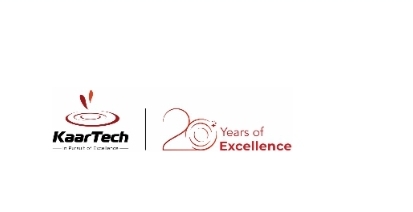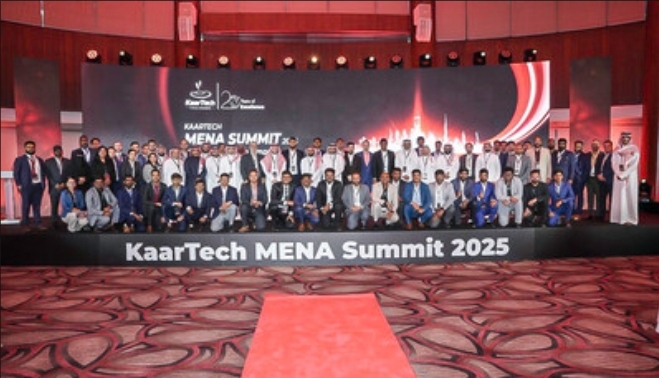KaarTech MENA Summit 2025: Turning Vision into Value Through CX-Led Transformation
Across the Gulf, executives talk endlessly about transformation. But for many, that conversation still feels like an unresolved promise. Enterprises pour millions into cloud systems, automation tools, and AI models—but when customers still face friction or employees lack clarity, transformation feels cosmetic. At the recent KaarTech MENA Summit 2025 in Riyadh, this candid truth surfaced repeatedly: GCC organizations are ready to move beyond digital ambition and start delivering measurable, value-driven outcomes.
The Reality Check: Ambition vs. Execution
Many transformation programs across the GCC start with energy and optimism but fade under the weight of fragmented governance, legacy processes, and unclear ownership of outcomes. While 83% of Middle East CIOs plan to increase technology spending, fewer than half report measurable business benefits from those investments.
The KaarTech MENA Summit aimed to close this gap. By convening C-level leaders, digital strategists, and industry innovators from across the region, the event offered more than perspectives—it offered proof points of what works in enterprise transformation when CX and EX come first.
Shahinsha Abdul Basheer, MENA CEO of KaarTech, opened with a clear message: “Transformation is not a technology checklist—it’s a long-term commitment to customer success backed by disciplined governance and continuous delivery.”
His keynote challenged the region’s enterprises to stop equating modernization with transformation. Adopting systems, he argued, is just one layer; true transformation starts when processes, teams, and leadership decisions align around customer outcomes.
Vision-to-Value: From Framework to Practice
At the center of KaarTech’s approach lies its ‘Vision-to-Value’ framework, a structured methodology designed to turn digital goals into tangible outcomes.
The model focuses on three pillars:
- Governance – Establishing clarity of decision-making and accountability from the outset.
- Reliability – Building stable digital environments where performance drives trust.
- Value Realization – Continuously measuring how transformation enhances customer and employee experiences.
This disciplined approach counters one of the biggest risks in modern enterprise strategy: the temptation to celebrate adoption metrics instead of outcome metrics.
By embedding governance early, KaarTech helps organizations prevent “initiative fatigue,” a common condition where overlapping transformation projects lose focus and momentum.
When AI Becomes Real: The Fireside Chat That Set the Tone
One of the most discussed sessions at the summit was a fireside conversation led by Maran Nagarajan, Global CEO of KaarTech, with Rakan Alotaishan (CIO, SATORP), Mohammed Alyousef (GM of Products & Solutions, NCGR), and Yaqoob Al-Hattali (Head of ICT, EDO).
Their discussion centered on AI-first enterprise growth—and what it means in operational terms. The conversation quickly turned practical: instead of debating whether AI can transform business, the focus shifted to how organizations can responsibly deploy it across functions to improve reliability, decision accuracy, and scalability.
Each speaker offered a grounded view. Alotaishan noted that success with AI demands stronger data governance; Alyousef highlighted that rapid experimentation must still comply with risk frameworks; Al-Hattali emphasized a unified view of data across the organization as non-negotiable.
From Experimentation to Enterprise-Grade Transformation
AI adoption, as the panelists agreed, must mature beyond experimentation. Organizations that win in this phase are those that design governance frameworks capable of integrating AI with core processes.
Maran Nagarajan reinforced this point in his reflection: “AI-first doesn’t mean blind automation. It means aligning technology with measurable outcomes—predictive maintenance in manufacturing, proactive decision support in logistics, or personalized service in utilities. The goal is reliability, not novelty.”
That distinction captures a growing maturity in the GCC’s enterprise landscape. As digital projects proliferate, companies are realizing that merely adopting technology isn’t a differentiator; embedding purpose and reliability into digital strategy is.
Collaborative Leadership: Breaking Silos to Build Value
Another standout theme of the summit was collaboration—inside and outside the enterprise.
Panels and breakouts focused on how cross-functional governance can sustain digital momentum. Too often, digital transformation lives in isolated teams, disconnected from CX or EX priorities. This fragmentation leads to slower execution and diluted value.
The summit’s participants explored how integrated governance—where IT, operations, HR, and CX leaders co-own transformation—can dramatically reduce project overruns and misalignment.
In one panel, a regional utility company shared how its digital journey initially stalled because of disconnected leadership priorities. After establishing a clear “value council” that included both technology and customer divisions, they saw measurable improvements in both CX feedback scores and operational efficiency.
KaarTech’s team emphasized this as a repeatable success model: governance not as a compliance mechanism, but as an enabler of speed, trust, and shared accountability.
Reliability as the New Competitive Advantage
In markets where customer expectations evolve faster than technology roadmaps, reliability has emerged as a defining factor of brand trust.
Research shows that customers across the GCC are 2.4 times more likely to recommend a brand that consistently delivers reliable digital experiences, even over those offering occasional innovation.
This is where governance and CX intersect directly. KaarTech’s thought leadership reinforces that reliability is not a technical metric; it’s a customer perception built through every system update, service response, and employee interaction.
As Maran observed, “Transformation is human before it’s digital. When employees trust the systems they use, that confidence passes on to customers.”
Embedding CX and EX in Enterprise Strategy
Beyond technology, the summit served as a reminder that employee experience (EX) and customer experience (CX) are inseparable.
Sessions repeatedly underlined that large-scale digital programs often fail not because of poor tools, but because employees feel excluded from the transformation narrative.
To address this, KaarTech promotes a human-centered transformation model, ensuring that employees become advocates, not obstacles, of digital progress. This means proactive change management, upskilling, and creating transparent success measures that connect employee contribution to enterprise outcomes.
One senior participant from a Saudi telecom operator shared how embedding EX metrics alongside CX measures helped the organization increase adoption rates of new internal platforms by more than 30% in six months.
The Power of Ecosystem Thinking
True transformation cannot happen in isolation. The collaborative spirit at the MENA Summit proved that value creation in today’s digital economy depends on ecosystem partnerships—between technology providers, consultants, regulators, and customers.
By hosting the region’s first independently organized transformation summit, KaarTech positioned itself as a trusted orchestrator of ecosystems, not just a technology enabler. It opened the floor to cross-sector dialogue that can accelerate progress across verticals—from energy to public services to logistics.
Attendees appreciated that the summit was not about sales pitches, but shared learning. Many left with fresh perspectives on how to codify lessons from one sector into another without losing sight of CX integrity.
Looking Ahead: From Summit to Sustained Value
KaarTech’s leadership made it clear—the Riyadh summit marks the beginning, not the climax, of a sustained journey with the GCC enterprise community.
Its purpose is to help enterprises build AI-first, outcome-driven transformation ecosystems where every initiative is governed, measurable, and customer-centered.
As Shahinsha summed it up, “When vision aligns with value, transformation becomes sustainable. We want to help every enterprise move from ambition to reliability—to make digital transformation not a milestone, but a movement.”

Actionable Takeaways for CX and EX Leaders
- Reframe governance as empowerment: Create “value councils” that align departments around shared outcomes, not individual targets.
- Anchor transformation in reliability: Measure success through consistent customer satisfaction and process accuracy, not just project completion.
- Integrate CX and EX: Treat employees as experience builders; their trust in tools determines customer trust in the brand.
- Operationalize AI responsibly: Embed AI with clear governance frameworks ensuring transparency, scalability, and measurable impact.
- Foster collaborative ecosystems: Partner across sectors to share transformation insights, accelerate adoption, and avoid repetitive mistakes.
The CXQuest View
The KaarTech MENA Summit 2025 reflects more than a regional event; it signals a shift in how organizations across the Gulf view digital transformation. The focus is finally moving from infrastructure to impact, from deployment to governance, and from aspiration to accountability.
For CX and EX professionals, the message is unmistakable: technology is the medium, not the meaning. Transformation that prioritizes reliability, governance, and human experience is what truly drives lasting enterprise value.

